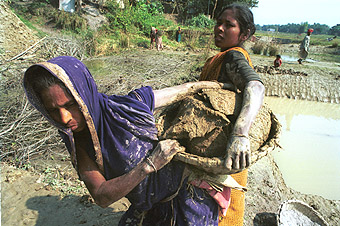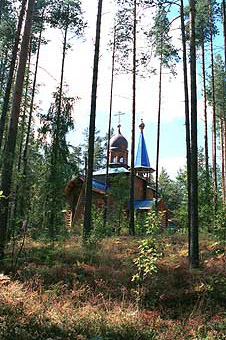AUGUST 26 - SEPTEMBER 4, 2002
JOHANNESBURG / SOUTH AFRICA


AUGUST 26 - SEPTEMBER 4, 2002 JOHANNESBURG / SOUTH AFRICA  |
| Ten years after the United Nations Conference on Environment and Development (UNCED) held 1992 in Rio de Janeiro, a World Summit on Sustainable Development will take place on August 26 - September 4, 2002. Representatives of governments, international organizations, nongovernmental organizations (NGOs) and also of churches and other faith communities will gather in Johannesburg (South Africa) for this event. South Africa will host almost 50’000 according to the expectations of the UN secretariat. The World Council of Churches (WCC) and a number of representatives of member churches and world communions have accompanied the follow-up to the Rio conference during the last ten years, and have participated in the preparatory process of the WSSD. The Ecumenical Team formed for this purpose will be active at the final (May 27 - June 7) preparatory meeting to the WSSD in Bali (Indonesia), and at the summit itself. Background For more than twenty years, the WCC has been engaged in efforts within its own worldwide constituency to build a faith-based understanding of the integral relationship between social justice, human development and protection of the environment. Taking stock ten years after the Rio Summit in 1992, the ecumenical community approaches the Johannesburg Summit with the deep concern that, once again, hope will be dashed by unfulfilled promises. The failure to implement the decisions taken and recommendations made in Rio, and unfulfilled expectations at the Monterrey Summit on Financing for Development say more about the reality we are confronting than promises made so far in the preparations for the Johannesburg summit. |
DOCUMENTS... ...AND
PRESS RELEASES ...AND WEBSITES
|
| In the ten years since Rio, the concept of "sustainable development", combining the need for development with the concept of sustainability, has been undermined by the inexorable march of corporate-driven, market-oriented economic forces and their global outreach. The underlying development paradigm, with its strong emphasis on economic growth and market expansion, has served first and foremost the interests of powerful economic players. It has further marginalized the poor sectors of society, simultaneously undermining their basic security in terms of access to land, water, food, employment, other basic services and a healthy environment. International trade, financial investments and private-public partnerships are still operating within the same framework. |  Women moving soil to secure their homes against flooding in Harirampur, about 80km west of Dhaka, Bangladesh. |
| In addition, the net flow of wealth from the South to the North has increased as a result of a worsening debt crisis, unfulfilled promises of international cooperation on the part of the OECD countries, and the ascendancy of negative aspects of globalization. This has included a weakening of political institutions and their legitimacy at national and international levels, and the inability of a majority of countries to ensure the economic, social and cultural rights of their people over against powerful global actors. The beneficiaries seem content as long as their governments protect their privileged, non-sustainable way of life. A change of direction is essential. Vision The WCC’s perspective on the WSSD process is grounded in its conviction about the sacred nature of all Creation, and about life as an interplay of spiritual and physical dimensions. We uphold the common human vocation to live in right relationship with our neighbours, the Earth and the Creator, respecting the integrity of the Earth and working for the health and wellbeing of all members of the Earth community. Its sacred origin makes the Earth the common inheritance of all peoples for all times, to be enjoyed in just, loving and responsible relationships with one another. |
 ...the sacred nature of all creation |
This understanding, that developed in the WCC’s participation in the UNCED follow-up process, is foundational for the ecumenical vision and call for an alternative approach. Instead of referring to "sustainable development", the WCC advocates working toward the building of "sustainable communities". The social idea of sustainable communities implies the nurturing of equitable relationships both within the human family and also between humans and the rest of the ecological community. Such communities imply a just and moral economy where people are empowered to be involved in making decisions that affect their lives; where public and private institutions and enterprises are accountable and held responsible for the social and environmental impacts and consequences of their operations; and where the Earth and the whole created order is nurtured with utmost respect and reverence rather than exploited and degraded. |
| By asserting the primacy of justice, ecological sustainability and the creation of viable communities, the ecumenical community states that authentic human development can never be achieved when the ultimate goal is amassing wealth and material goods, especially when these are at the expense of others in the global community and of the health of the global environmental commons. Justice and equity must be at the heart of any sustainable economic, social or environmental system supporting the whole Earth Community. Goals The WCC wants to bring clarity, critique and alternatives to the WSSD negotiations and the debate on sustainable development: |